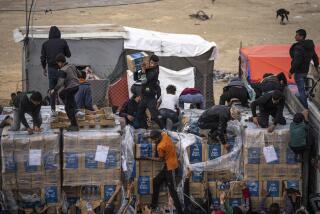Croatia Truce Shaky as Fighting Claims 6 Lives : Yugoslavia: Three Serbs are killed by federal warplanes in an apparently mistaken attack.
- Share via
DUBROVNIK, Croatia — A truce declared in battle-scarred Croatia five days ago appeared to be falling apart Sunday after renewed fighting claimed six lives over the weekend.
Mistrust between Serbs and Croats also thwarted a full exchange of prisoners and the deployment of cease-fire monitors to prevent further violence in the republic where more than 200 have been killed in ethnic clashes in recent weeks.
Five prisoners were exchanged between Croatian police and Serbian rebels on Saturday. And on Sunday, Reuters news agency reported, 20 more were exchanged, equal numbers of Serbs and Croats. But plans for a larger release of captives were scuttled when Serbs holding more than 100 Croats refused to go to the designated transfer point in the city of Osijek, saying they feared arrest by Croatian authorities.
Officials with a federal cease-fire monitoring commission later proposed that the swap be made near Belgrade.
Reuters reported that two Serbian guerrillas and a 10-year-old boy were killed Sunday when Yugoslav jets apparently attacked the wrong target in Croatia. Two jets strafed a roadblock manned by armed Serbs and also hit a village near Vrginmost, south of the Croatian capital of Zagreb, after Croatian national guardsmen fired at an army helicopter, police said.
Six other people, assumed to be Serbs, were wounded in the attacks on the barricade and the village of Poljana.
A police officer said the jets apparently mistook the Serbs’ barricade for a position occupied by Croatian national guard members who have been involved in fierce fighting with Serbian guerrillas.
Croatian radio reported Sunday that three men were killed overnight in mortar attacks on villages in the volatile Slavonia region of southeastern Croatia. One of the victims was a Croatian television cameraman, at least the fourth journalist killed in Yugoslavia’s civil war. The broadcast blamed the deaths on “terrorists,” the label Croatian authorities attach to Serbian rebels fighting against independence for the republic.
Croatia and the neighboring republic of Slovenia declared themselves sovereign states on June 25, setting off violent resistance by federal and Serbian forces.
After more than 70 people died during a federal army attack on Slovenia, Yugoslav authorities ordered troops out of the tiny alpine republic, effectively granting it independence.
But many of the 600,000 Serbs living in Croatia--Yugoslavia’s second-largest republic with 5 million people--are staunchly opposed to separation from the federation that binds them with Serbia.
Armed Serbian militants backed by troops and tanks of the Serbian-dominated federal army have seized considerable Croatian territory in guerrilla actions this month.
The federal cease-fire commission has proposed sending monitors to the Croatian regions under Serbian control, but officials in the Croatian capital of Zagreb oppose this. They fear the commission, chaired by Serbian allies, aims to keep the peace only long enough to give the federal army time to prepare for an all-out attack on Croatia.
At a press conference in Belgrade, commission member Irfan Ajanovic dismissed Zagreb’s claim as an attempt to gain “a better political and psychological position.” But Ajanovic conceded that the deployment of monitors is being postponed until further talks with the Croatian leadership.
More to Read
Sign up for Essential California
The most important California stories and recommendations in your inbox every morning.
You may occasionally receive promotional content from the Los Angeles Times.














